We Wanna Be Free: Screamadelica at 30
We look back at Primal Scream's magnum opus at 30 – the last word on dancefloor-ready neo-psychedelia whose influence is still felt today
'We wanna be free to do what we wanna do / And we wanna get loaded and we wanna have a good time!'
So demands Peter Fonda in the intro to Loaded, in a speech far more famous than the film it came from (The Wild Angels, not Easy Rider), succinctly setting out the late 60s counterculture stall. And this was precisely the hedonistic vibe that The Stone Roses had catapulted into the mainstream a year earlier in 1989 with their self-titled debut, hinting at a style that the fledgling Primal Scream had been struggling to find in their early years.
Released a full 18 months before Screamadelica, Loaded was the first taste of what was to become the defining document (alongside The Stone Roses) of the neo-psychedelic movement that dominated British alternative music in the late 80s and early 90s. Now, 30 years on, it's clear why this album was a watershed moment; from its iconic acid-dappled cover art, through the house-inspired production of the late Andrew Weatherall, to the kaleidoscopic exuberance that bleeds through each glorious song.
Before this album, Primal Scream were grasping for an identity. Despite helping to inspire the C86 jangle-pop sound with their waifish, underrated Velocity Girl in 1986, the band had switched line-ups and experimented with different styles over two poorly received albums. But Bobby Gillespie's omnivorous musical appetite and willingness to incorporate anything going is what gives Screamadelica its uniquely jumbled flavour (not unlike The Avalanches' Since I Left You, though they needed over 1000 samples to do it, not just bongos, ecstasy and a working knowledge of mid-80s Chicago house).
The album opens with Movin' On Up – unashamedly cribbing from The Rolling Stones' Sympathy for the Devil – which provides one of the few links to past and future Primal Scream with the searing hard-rock guitars, but the prominence of gospel singers, the electronic production and Gillespie's light touch vocals are the first signs that this is a different beast. The psychedelia is immediately dialled up on the cover of Slip Inside This House, with whirling sitars sitting next to a syrupy Amen break. And then Don't Fight It, Feel It runs dangerously close to the vapid dance music of the era that paired interchangeable soul singers with pseudo-transcendent electronics, but is saved by Weatherall's Midas touch and the thrilling Italo-house piano that enters midway through. These three songs are very different, but they represent the album perfectly in their marriages of dance and rock, along with so much more.
Gillespie is a less prominent vocal presence throughout the album (sometimes not appearing at all), frequently ceding the floor to the many experimental flourishes; the pitched-down orchestra plus haunted yodelling of Inner Flight; the shrill, overbearing saxophone of I'm Comin' Down; the corny/cosmic psychedelia of Come Together (which gestates for almost five minutes before the uplifting chorus comes in); the spooky accordion of Shine Like Stars. It gives the album an inclusive, cohesive feel, ideal for the sense of collective hedonism and creative freedom that permeates and defines Screamadelica.
By the time Screamadelica won the inaugural Mercury Prize in 1992, the burgeoning movement was over, the dance elements to be subsumed into the harder rave scene of the 90s and the rock elements to provide the seeds that Britpop would soon take up and ride to chart domination for the rest of the decade. Tellingly, the band never attempted another album that sounds like this one, perhaps appreciating the unique, lightning-in-a-bottle magic at play here.
But its influence has been strongly felt both at home and abroad; Scottish indie was brilliant in the 80s (Orange Juice, The Associates, Aztec Camera etc), but the parameters were fairly narrow until Primal Scream opened the door to funk, house, electronic etc. This openness continued in great 00s bands like Life Without Buildings and Franz Ferdinand and is still felt today in Django Django and even Young Fathers.
Outside Scotland, Daft Punk have praised Screamadelica's brilliance and Mark Ronson cites the album as the one that got him into indie, informing his production style to this day. Solar Power, the first single from Lorde's most recent album, is clearly indebted to Loaded, so much so that she contacted Gillespie to get his approval. Lorde claims she'd never even heard of Primal Scream, all the more evidence that the band's influence has seeped into international musical culture, though perhaps lacking the recognition.
For a brief moment, rock, acid-house, psychedelia and more congealed into a gleeful genre-less gloop that focused more on vibes than posturing, an unabashed desire for joy that wouldn't be seen again until the internet started to break down genre borders in the late 00s. It couldn't happen again, and it would be foolish to attempt, but Screamadelica is the culmination of that moment and a potent gateway drug to experience those feelings again.
Screamadelica was first released on 21 Sep 1991 via Creation Records
